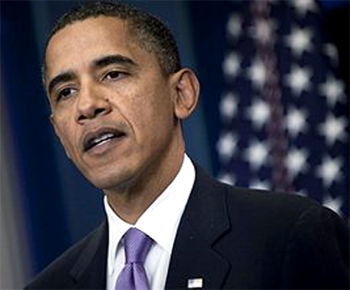Feb 13, 2026
Feb 13, 2026
 President Obama’s November 6-9 visit to India has engendered expectations in both the camps; although for different reasons. India is expecting a friendlier America, which would help it consolidate in the world podium. And the US naturally seeks a wider opening of Indian markets in order to uplift its sagging economy through a boost in exports.
President Obama’s November 6-9 visit to India has engendered expectations in both the camps; although for different reasons. India is expecting a friendlier America, which would help it consolidate in the world podium. And the US naturally seeks a wider opening of Indian markets in order to uplift its sagging economy through a boost in exports.
30-Oct-2010
More by : Dr. Uddipan Mukherjee

|
Absolutely Mr Adhikari, I fully agree with you. May God bless India and us Indians. regards Uddipan |

|
If we want to remain one nation with secured borders, it is important, that before the demise of the U.S of A as the sole superpower, we take our seat on the world stage. That does not just mean a seat at the UNSC, but a "true power" on its own rights, capable of leading and influencing the majority of the world countries. Did the U.S wait for any superpower get seat at the UNSC or the veto? The question is, are we ready to take some tough decisions? My take is " KHUD KO KAR BULUND ITNA KI JAB TU CHALEY ZAANIBEY MANZIL, LOG JUDTEY JAYE OR KAFILA BANTA JAYE. YES WE CAN" - Jai Hind |

|
Thank you Sir for the comments. I too agree with you that "there is no permanent friend or foe in world politics". And I also fully agree with you regarding the hegemonic ambitions that America has and in fact, which is expressly manifest since 1991; for that matter, since 1917. It certainly does not require any intelligence to decipher that. Ne'ertheless, my point is to harp on Realpolitik rather than on the emotive side of the issue. We have been tilting toward the US since 1991, and that has been because of the 'inability' to prop our politico-economic wherewhithal vis-a-vis a nation like China. We lack 'strong' leaders with 'spine' who could, if not 'do', at least fire rhetoric toward the hegemon; like what Venezuela or Cuba or Iran does. Well, it may sound child-like and little bit binary that I am professing a solution of 'extremes'. But India needs to grow up and needs to express itself. For that, it needs to grow up economically and in terms of defence. The signs are not very encouraging keeping in mind the inherent bottlenecks we possess: the cobweb of myriad contradictions. Amidst such a backdrop, what is the best possible solution for India? Well, there are a few paths: 1. Remain frozen in the foreign policy regime and deal on a case by case basis. but that shall be difficult in the coming period as India is now a part of the Security Council 2. Take a pro-active stance and essay to forge an alliance with China to counter the American-backed western threat. That seems highly unlikely keeping in mind the misgivings both the countries have for each other. 3. Take a pro-active stance and essay to forge a 'covert' alliance with the US to counter China and Pak; in fact, mainly China. Offering to train the ANSF is just part of that bigger strategy. Furthermore, it thwarts Pak designs in Afghanistan too. Let us take a decisive step in foreign policy. Let us come out of the shackles of a 'defensive' foreign policy zone; which rhetorically harbours an unrealistically liberal 'Sulh-i-kul' policy and falls flat on the platform of Realpolitik. Let us be Chanakya and Bismarck. regards Uddipan |

|
Foreign affairs has never been my cup of tea and I never felt tempted to dabble in it or speculate about it. But it is my humble opinion born of common sense that in foreign relation there is no permanent friend or foe. Still, fighting shy of Pax Americana by India has been a wise policy. To retain its position as super power America pursues policies which are not only unethical but also criminal. For cheap mineral resources, particularly oil, it has destroyed two countries - Afghanistan and Iraq. The invasion of the latter country was a brazen act of military misadventure started by that Texas cowboy Bush and his crony, the worst clown of a British PM in history Tony Blair. Islamic Terrorism, specially of Osama, is solely America's creation. The Western powers want to keep the Middle East in perpetual turmoil for exploitation of its mineral resources in their own economic interests. It is they who are using this opium of religious fundamentalism to deliberately keep the Islamic countries backward to facilitate their exploitation. It is a pity the political leaders of the Middle East countries are unable to see through this game and unite against their common foe. |